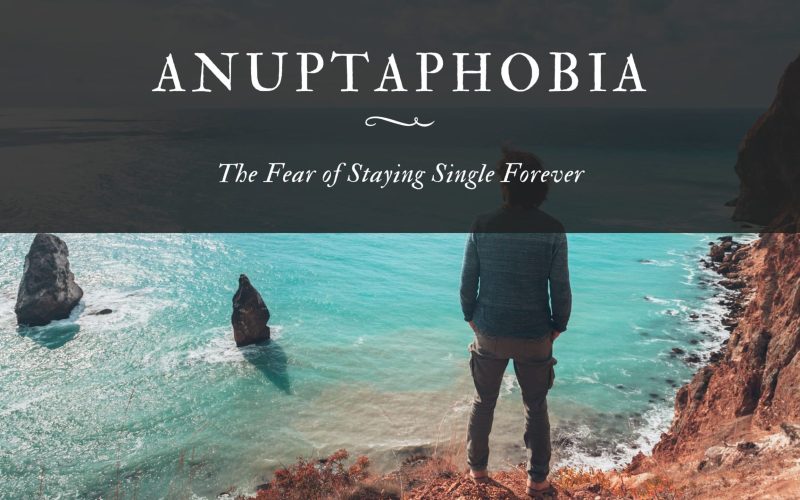There are so many social phobias, of which anuptaphobia is one of them. Anuptaphobia is the irritational fear of being or staying single.
This type of fear is not a minor one, as it disrupts the phobics’ lives due to its intensity. This phobia relates to the term gamophobia, which is the fear of marriage.
People who suffer from anuptaphobia may have severe cases that they may never be single due to the fear and anxiety of being alone.
They are never really single because they go from one relationship to another for fear of being single until they are old and dying single.
This fear is actually surreal, as no one can predict their future, whether they will end up single or not.
People with anuptaphobia make painstaking efforts to remain in a relationship. They would rather be in a destructive and abusive relationship with the promise of a lifetime commitment because they dread what will happen if they remain single.
An essential focus of someone with anuptaphobia is finding the ideal partner in which they make the topmost priority in their life.
Conquering the fear of anuptaphobia is extremely difficult, and the sufferer may allow their phobic tendencies to take over their lives.
Symptoms of Anuptaphobia
Symptoms of Anuptaphobia can go from mild to alarming. Symptoms vary among people, and they may experience trembling, heart palpitations, rapid speech, elevated blood pressure, nausea, dread, worry, low self-esteem, intense anxiety, jumping into quick relationships, inability to cope with strong emotions, and depression, if not handled carefully, may develop into full-blown depressive disorders.
They lack confidence in themselves and prefer being hurt physically and psychologically in a relationship than being single.
This irrationality and ineptness bring emotions like shame, sadness, and fear, allowing them to cope with the mental anguish and deepens their anuptaphobia.
These symptoms make them so desperate and over-concerned with being in romantic relationships with people whom they do not want to be with to simply fill the thoughts of not wanting to be single. This brings additional problems, increasing the effects of their phobia.
Causes of Anuptaphobia
Anuptaphobia is among the listed social phobias with complex causes that are not easily defined. There is no definite cause of this phobia.
People who have anuptaphobia may not have a simple explanation for this phobia.
However, this phobia can arise from external events, internal predispositions, genetics, hereditary factors, brain chemistry, and life experiences.
- External events: Traumatic experience, such as their heart being broken by someone they love, which triggers anuptaphobia.
- Genetics: Having a family with specific phobias and anxiety disorder can increase one’s risk of having anuptaphobia due to a genetic disposition. With such genetic traits, once they experience some traumatic event, they develop full-blown anuptaphobia
Other environmental factors that can trigger anuptaphobia are childhood events of being frequently teased.
These events bring a feeling of inadequacy, and if the feelings are intense with genetic backup, they trigger this phobia in the person.
Anuptaphobia may also be a result of deep personal insecurities like having a poor image of oneself and loathing.
People who are convinced that they are not good enough because they have a bad conviction about themselves strongly desire not to be single because they believe being in a relationship or having a significant other would feel that void within them and fix their insecurities.
It is important to note that there is no medicinal treatment for anuptaphobia. Drugs given can only help suppress the symptoms of this phobia but may also have adverse side effects; however, there are ways this phobia can be handled.
How to Deal With Anuptaphobia?
People who suffer from anuptaphobia can overcome this phobia if handled rightly.
Talk Therapy
Most people who have anuptaphobia are not aware that their thinking patterns are wrong. Continuous talk sessions with a therapist will enable them to see their default thinking patterns, learn advantageous ways of coping with the symptoms, and effect new behavioral changes.
Exposure Therapy
The purpose of exposure therapy is to gradually expose patients to their fears. With time, they realize that their fears may not be as harmful as they perceive them to be.
The more fear they are exposed, the less bothered they are of those fears. It is usually advised that an experienced professional therapist implement this therapy due to the intense anxiety involved.
However, those who have mild anuptaphobia do not need therapy sessions. Therapy is only needed when the phobia is so intense that it affects their daily activities and life choices.
Many people do not allow the fear of ending up alone to overwhelm their common sense of reasoning.
Also, the fear of being alone is a good sign, but you must seek a solution if it becomes intense and beyond your control.








